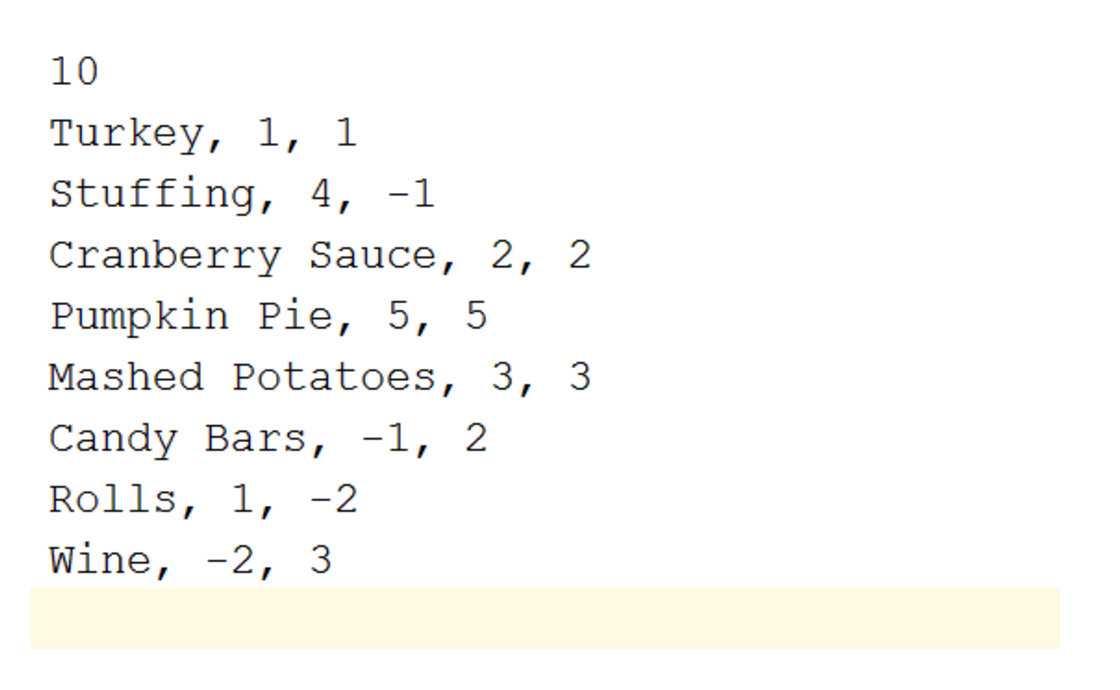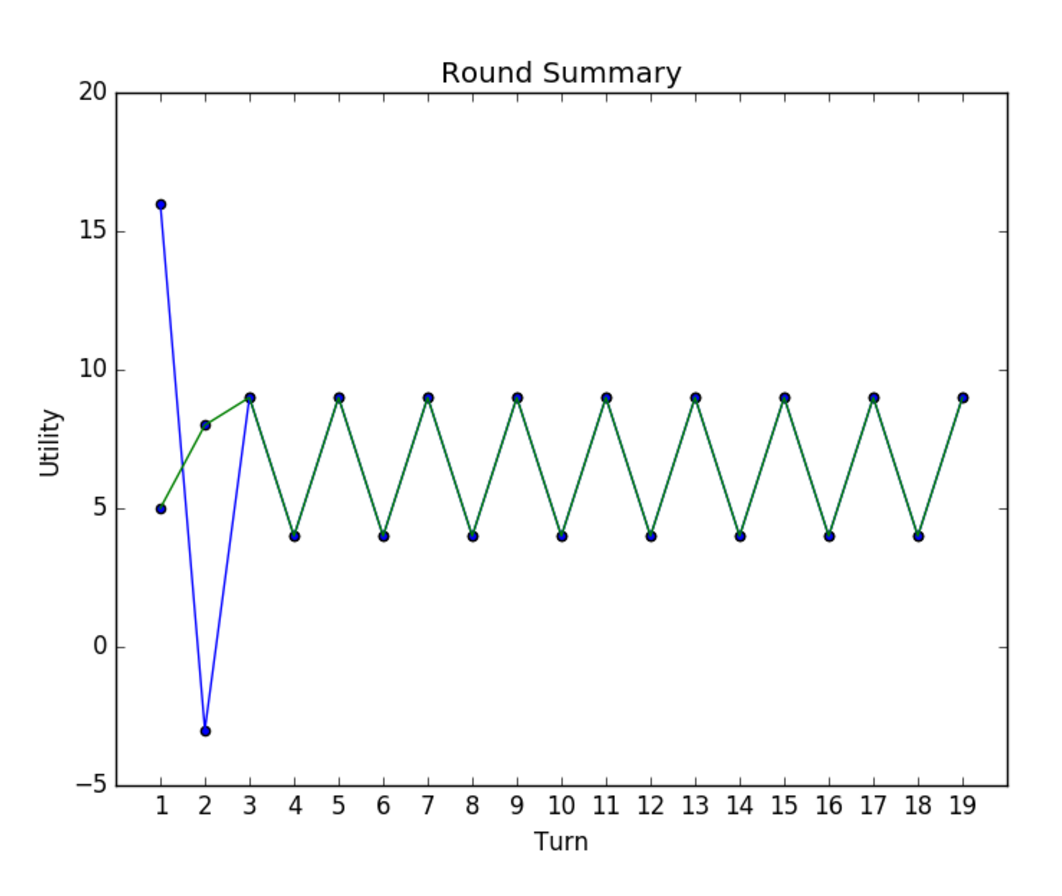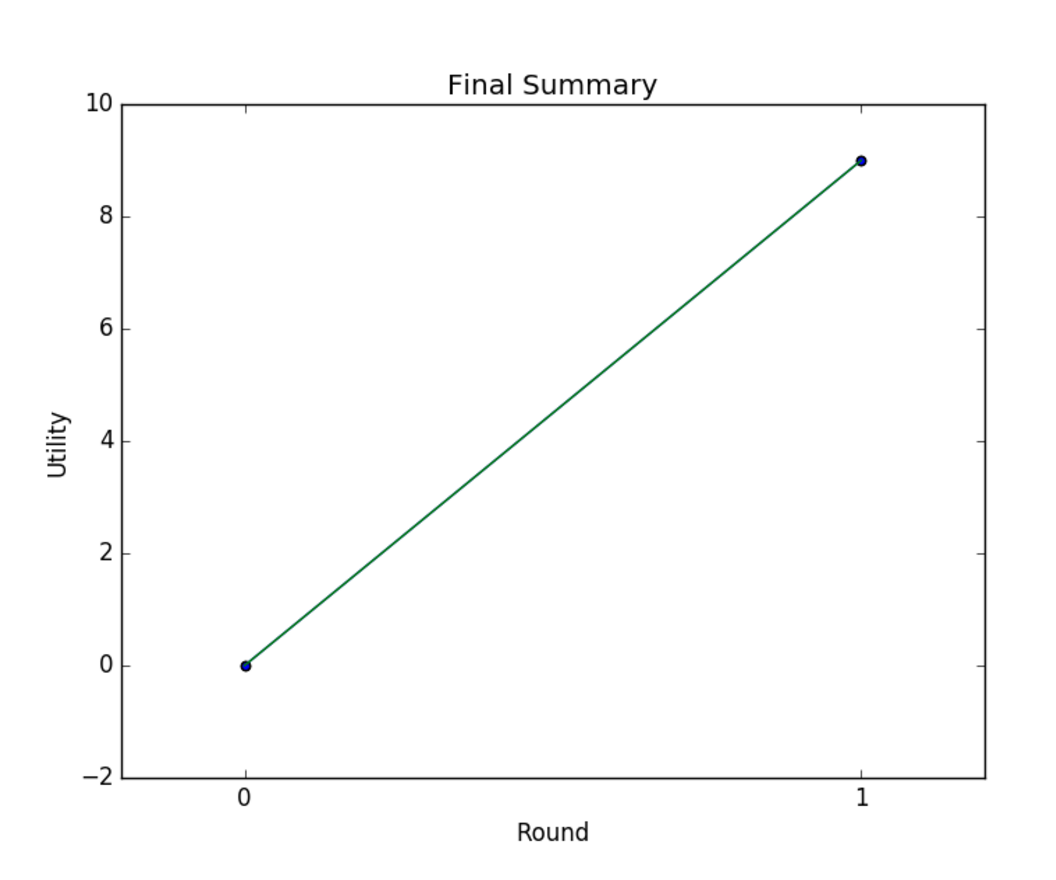A negotiating agent written in Python
Each negotiation will be over a set of items that have a utility value specific for each negotiator (not necessarily the same). The negotiation structure will consist of alternating offers with a finite turn limit.
Rules: Each offer will be the set of items a negotiator wishes to take for itself. Both agents will receive a substantial negative reward if no agreement is made.
Goal: Within finite turns, get higher reward.
Language: Python
After a brief analysis of how to get maximum reward, or our baseline limit, we found the following strategies:
*Note: Starting first will be able to make the final offer, starting second will be able to decide whether to accept opponent's final offer
-
2/3 of total reward, accept! Since opponent’s total utility and preferences for items are different than ours. As soon as we receive 2/3 of our total reward, we accept the offer.
-
1/3 of total reward, baseline. If I start second, I can decide whether to accept opponent's final offer. Accept any offer more than 1/3 of my total utility
-
Keep track of opponent's favourite list. Keep track of how many times each item the opponent has requested.
# initialize a global variable to store the maxTurns
maxTurns = 0
# declare a global dict to keep track for opponent's moves
oppo_dict = {}
def make_offer(self, offer):
update the current turn
update opponent offer in oppo_dict
if going first, offer all positive util items
if last turn:
if last chance to accept offer:
accept any offer more than 1/3 of my total utility OR just reject the offer and take penalty
else you are to give the final offer:
add items that opponent never offered to my wanted list
if less than 2/3 amount achieved
add the opponent least wanted one until we reach 2/3
Negotiating moves:
if offer is not None:
if more than 2/3 will receive, accept, negotiation completed!
else
instantiate our offer to whatever left
while our offer < 2/3 of total utility
add max worth item in opponent offerDecision process for final offer, including giving, accepting, and rejecting
# to see if it is the last turn, and accept whatever offer
if currentTurn is maxTurns:
if currentTurn > ky2cg.getTurns(self):
# then you are to accept the final offer
self.offer = offer
self.offer = BaseNegotiator.set_diff(self)
if (self.utility() >= (self.totalUtility() / 3)):
return self.offer
else:
self.offer = BaseNegotiator.set_diff(self)
# print "You bad!!! I'd rather get negative leward!!!!"
return self.offer
else:
# then you are to give the final offer
total = 0
ourOffer = []
# look at the nonoffered items first
ordering = self.preferences
for item in ordering.keys():
if not oppo_dict:
break
if (item not in oppo_dict and ordering.get(item) >= 0):
ourOffer = ourOffer + [item]
total += ordering.get(item)
if (total >= (2 / 3 * self.totalUtility())):
self.offer = ourOffer
return self.offer
while total < (2 / 3 * self.totalUtility()):
min = min(oppo_dict, key=oppo_dict.get)
ourOffer = ourOffer + min
total += oppo_dict.get(min)
del oppo_dict[min]
self.offer = ourOffer
return self.offertotal-random negotiator: To test the efficiency of our negotiating algorithm we created total-random negotiator. The total-random negotiator utilize extremely simple and random algorithm, randomly compile an offer that is greater than 2/3 of total utility if it goes first. When it is given an offer, it will probabilistically accept the offer or reject the offer by offering back the same offer. When it is the last turn, the algorithm will accept any offer so that a deal could be made.
When we tested our code against this total-random negotiator we realized this will end up, in most cases, deterministic, meaning the utility received by both parties are the same over every iteration. See results below (total-random utility: 9, main algorithm: 9):
One key insight we had was the possibility of opponent using an extremist algorithm that pushes very aggressively for a high utility value for them. We had to account for that by building in different thresholds at different stages of the negotiation in which we will accept an offer. Our original algorithm also did not account for opponent’s actions, other than the offer they present. By developing the functionality that keep track of what the opponent has offered in the past, we are able to better adjust our strategy in late-game scenarios.
The testing results we saw throughout this project demonstrated that this algorithm can become very deterministic, depending upon the opponent’s strategy. This is not alike what a human negotiator would do, where backtracking, price-raising, etc. can be used in response to what an opponent does.
Our implementation is not an overly aggressive one, in that it does not push the negotiation to the brink in order to maximize our gain. We believe this algorithm that aims for a fair distribution that can benefit both parties can maximize our opportunities in achieving a high overall utility after many rounds of negotiations, facing different negotiators.


